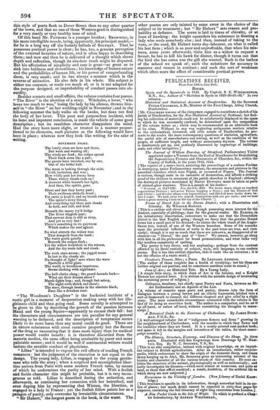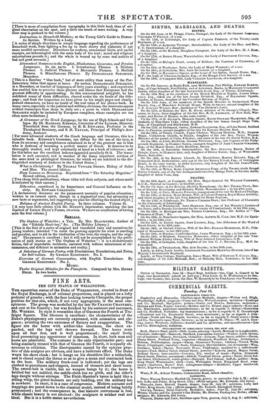PUBLICATIONS RECEIVED, From June 14th to June 20th.
Booms.
Spain and the Spaniards in 1843. By Captain S. E. WIDDRINGTON, &c., Author of "Sketches in Spain in 1829-30-31-32." In two volumes.
Historical and Statistical Account of Dunfermline. By the Reverend PETER CHALMERS, A.M., Minister of the First Charge, Abbey Church, Dunfermline.
[Mr. CHALMERS was one of the clergymen engaged to contribute a sketch of his parish of Dunfermline, for the New Statistical Account of Scotland; but find- ing his collection of materials could not be satisfactorily displayed in the space IO which he was necessarily confined, he determined upon the composition of the volume before us ; ohich may be recommended as an admirable book of its class. Without in any way neglecting antiquarian matters relative to the ecclesiastical, historical, and civic annals of Dunfermline, he pre- sents to the reader the more contemporary questions of statistics, agriculture, the useful arts of manufactures and mining, as well as the condition of the people, at sufficient length, and without unnecessary dryness. The volume is handsomely got up, and profusely illustrated by engravings of buildings, seals, and other antiquities.] The Journal of William Dowsing, of Stratford, Parliamentary Visiter appointed under a Warrant from the Earl of Manchester for Demolishing the Superstitious Pictures and Ornaments of Churches, Sc.c., within the County of Suffolk, in the years 1643, 1644. [The reprint of a scarce tract, narrating the proceedings of a zealous Puritan in destroying, under Parliamentary warrant, the ornaments and pictures in the parochial churches, which were Popish, or savoured of Popery. The Journal is curious, though same in its narrative of devastation, and affords a striking proof of the richness in ornament of,the parish churches in England ; although the destroyed pictures mentioned by Master DOWSING must be taken as parts of stained-glass windows. This is a sample of his deeds- - Sr FFOLK, AT HAVER,. Jan. the 6.h. 1643. We broke down about an hundred superstitious Pictures ; and acne,, Fryars hugging a Nunn ; and the Picture of God and Christ ; and diverse others very superstitious; and 200 had been broke down be- fore I came. We took away two popish Inscriptions with ora pro nobis ; and we beat down a great stuueiug Cross on the top of the Church."] Poems of Rural Life in the Dorset Dialect; with a Dissertation and; Glossary. By WILLIAM BARNES. [This is a curious and clever volume, though possessing more interest for the student, especially of philology, than for the general reader. Mr. BARNES, in
his introductory dissertation, endeavours to make out that the Dorsetshire
dialect is the best English going ; though we fancy that the genuine Dorset forms but a small part of his demand—he claims the whole trunk of the Anglo-
Saxon tree, instead of one of the Western branches. Some of his remarks
upon the provincial inflection of verbs in the past tense are true, and even useful; though it is not so much that these are unknown, as disapproved of or obsolete—as " flowed," the past of "blow." We cannot, however, go along with him in all his preferences for broad pronunciation, and what looks very like needless complexity of spelling. The poetry is very clever, and not unpleasing ; perhaps from the contrast afforded by its Doric rusticity of subject, style, and language, to our modern poems. But it has this critical objection, that it reads like an imitation ; it is not the effusion of a rustic mind.] Creation's Tenant, 21Ian ; a Poem. By LEONARD ADDISON. [The author of these couplets has a knack of versifying; but his ideas are neither original nor poetical, and he sometimes sacrifices sense to sound.] Joan of Arc; an Historical Tale. By a Young Lady.
[A simple little story, in which Joan of Arc is the heroine, and a Knight Dunois her rejected lover. It is written with the amiable design of inculcating the sustaining power of religion.]
Colloquies, desultory, but chiefly upon Poetry and Poets, between an El- der Enthusiastic and an Apostle of the Law. [A volume of remarks upon poets and poetry, thrown into the form og dialogues between a young lawyer and an elderly humourist, hitched into a sort of framework to connect the different chapters and give relief by a slight story. The most remarkable circumstance connected with the volume is the fact of its being an unwritten book. The author is a compositor, and he set it up off-hand, or rather off-head, without committing his thoughts to manu- script.] A Botanical Guide to the Environs of Cheltenham. By JAMES BUCK" MAN, F.G.S., &c.
[A. well-arranged tabular list of "indigenous flowers and ferns " growing lit the neighbourhood of Cheltenham, with the months in which they flower and
the localities where they are found. It is a neatly-printed coat-pocket book; and space is left in the margins and interstices of the tables, for short mane- script remarks.] The History, Structure, Economy, and Diseases of the Sheep. In three parts. Illustrated with fine Engravings from Drawings by W. HAR- VEY, Esq. By W. C. SPOONER, V.S., &C. [This is an able compilation imbued with original knowledge, on an import- ant subject to British agriculturists. After an introduction, rather encyclo. ptedic, which endeavours to show the origin of the domestic sheep, and traces sheep-keeping up to Abel, Mr. SPOONER gives an interesting account of the history and character of all the various breeds of this country. He next ex- hibits the structure of the animal, physiologically as well as anatomically; and lastly investigates its diseases,—which seem almost as numerous, and quite as fatal, as those that afflict mankind ; a result, doubtless, of the artificial life to which sheep are now subjected.] Excursions in the Vicinity of :London. (NewLibrary of Useful Know- ledge.) [This brochure is specific in its information, though somewhat bald in its no- tice of places ; but much detail cannot be expected in sixty-four pages for sixpence, containing the full itinerary of eight long excursions from 14-amt.]. A New Pocket Guide to the isle of Wight. To which is prefixed a Chap. ter Introductory, by ALFRED W HITEHEAD,
[There is more of compilation from topography in this little book than of ori- ginal observation on the spot, and a little too much of mere writing. A very clear map is prefixed to the volume.] Instructions in .Flousehold Matters; or the Young Girl's Guide to Domes- tic Service. Written by a Lady. [A series of simple directions in simple language regarding the performance of household work, from lighting a fire up to more showy and elaborate if not more needful operations. Directions for cookery, economical hints, and useful receipts, are intermingled with the main body of the text; moral and religious exhortations precede it ; and the whole is wound up by some real notices of bad and good servants.] Idiomatical Sentences in the English, Hindostanee, Goozratee, and Persian
Languages. in six parts. I. Introductory Phrases. 2. Military Phrases. 3. Judicial Phrases. 4. Mercantile Phrases. 5. Medical Phrases. 6. Miscellaneous Phrases. By DOSSABHAEE SonermsE, Moonsbee.
[This is a Bombay "blue book," but of more utility than many of the Par- liamentary folios that appear at home. Its author, DOSSABILLEE SORABJEE, is a Moonshee, or teacher of languages, of forty years standing ; and experience has enabled him to perceive those phrases and idioms that Europeans find the greatest difficulty in apprehending. In this conversational polyglott, he has exhibited many of those difficulties, classed under the six heads of the title- page ; and from the inspection we have given to his ample paves and clearly- penned characters, we have no doubt of the real value of his Aran-book. In many cases, especially in thejudicial and military divisions, the sentences appear evident transcripts from those in daily use ; a point in which DOSSABHAEE SORA.B.TEE might be imitated by European compilers, whose examples are too often mere inventions.] A Grammar of the Greek Language, for the use of High Schools and Col- leges. By Dr. RAPHAEL Kunlun, Conrector of the Lyceum, Hanover. Translated from the German, by B. B. EDWARDS, Professor in the Theological Seminary, and S. H. TAYLOR, Principal of Phillip's Aca- demy, Andover. [For more advanced students of the Greek language and literature, this is a valuable book. iiiiHNER'S Grammar, too diffuse for the use of the tyro, is from its accuracy and completeness calculated to be of the greatest use to him who is desirous of becoming a perfect master of Greek. It deserves to be thoroughly studied, and kept constantly at hand as a book of reference; and for this latter use the excellent indexes appended peculiarly fit it. The trans- lation is well executed, and is another of the many important services of the same kind in philological literature, for which we are indebted to the dis- tinguished seminary of Andover in the United States.] What is Christianity? By THOMAS VOWLER SHORT, Bishop. of Sodor and Man. The second edition.
Easy Lessons on Reasoning. Reprinted from "The Saturday Magazine." Second edition, revised.
[Two cheap little publications, whose titles tell their subjects, and whose merit is indicated by their success.]
Education, considered in its Importance and General Influence on So- ciety. By EDWARD COLLINSON.
[A declamatory discourse on the paramount necessity of popular education ; written in an earnest spirit, though in a dogmatical tone, but advancing no new facts or arguments, and suggesting no plan for effecting the desired object.]
Reliques of Ancient English Poetry. In three volumes. Volume IL [Avery neat little edition with Mr. XI oxon's imprimatur, matching the last reprints of Luton HUNT'S Poems, etcmtera. We have no recollection of having seen the first volume.]
SERIALS
The Orphan of Waterloo ; a Tale. By Mrs. BLACKFORD, Author of the "Eskdale Herd-boy," &c. (The Holiday Library.)
[This is the first of a series of original and translated tales and narratives for young readers ; intended "to resist the growing appetite for what is startling and peculiar, and to aid in the vindication of the true, the simple, and the origi- nal." The purpose is excellent ; but it will not be accomplished by the publi- cation of such stories as "The Orphan of Waterloo " : it is a melodramatic fiction, full of improbable incidents, narrated with tedious minuteness of cir- cumstance, and deficient in animation and reality.]
A Selection of German Poetry, with Elucidations, Translations, and Notes, for Self-tuition. By GEORGE EGESTOEFF. No. L Exercises of German Conversation, with English Translations. By GEORGE EGESTORFF. No. I.
Music.
Twelve Original Melodies for the Pianoforte. Composed by Mrs. BEERY DALE. In two books.



























 Previous page
Previous page